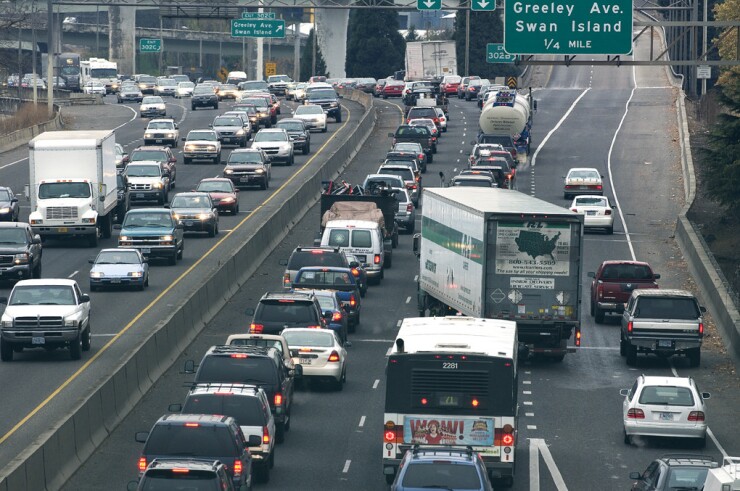DALLAS -- Oregon would gain an additional $8 billion over 10 years for transportation infrastructure if lawmakers approve the proposal outlined in a 298-page bill introduced on Wednesday that would phase in a 40% increase in the state gasoline tax.
The transportation measure developed by the 14-member Joint Committee on Transportation Preservation and Modernization would add 12 cents to the state’s current gasoline tax of 30 cents per gallon, bringing it to 42 cents per gallon in 2025.

The plan also calls for a statewide payroll tax of 0.1% to fund public transit and would allow the state to levy tolls to pay for additional lanes on two interstate highways.
Other revenue sources in the measure include a $100 per year registration fee for electric vehicles, increases in car and truck title and registration fees, a 5% sales tax on adult-sized bicycles, and a 0.75% tax on the purchase of new and used vehicles.
Fees and taxes in the road proposal would bring in an average of an additional $800 million per year for transportation projects.
Several major gridlock-busting projects are listed in the road bill, with the others to be included in a priority list that would be developed by the Oregon Transportation Commission.
The identified projects include adding lanes to Interstate 5 and widening of I-205. The proposal includes seismic reinforcing of a bridge on I-205.
Tolls could be used to help finance the new interstate lanes aimed at reducing congestion, which is allowed under the federal law that bans tolls on highways built with federal funding aid.
The additional revenue would allow the state to fund projects that relieve congestion, maintain vital transportation links, and better protect roads and bridges from a major earthquake in the region, said state
“If we want to solve the transportation problems that the people told us they want solved, this is what gets us there,” he said. “This is the minimum that gets us there and keeps the roads from failing, gets at the bridges, gets at the seismic issues.”
The $8 billion plan is the culmination of a year of hearings and discussions, Beyer said, noting that, "It feels good to have something out there for people to shoot at."
A common complaint from business leaders around the state was the traffic congestion in Portland that impedes the movement of goods and commodities, Beyer said.
"We forget sometimes that we're an exporting state, and all the freight – the economy of Oregon – has to go that way," he said. "It's just a question of do we want to address it or not."
A provision in the transportation measure would void the entire plan if any of the tax and fee portions are successfully challenged and overturned at a voter-initiated referendum, Beyer said.
“The logic is that this is a package,” he said. “If you pull one string, the whole thing comes apart.”
The Oregon Department of Transportation and localities in the state said earlier this year that they would need an additional $5 billion per year to fully renew state and local roads and bridges.
The state does not have the money to meet all the needs, said Rep. Caddy McKeown, a Democrat from Coos Bay who sits on the joint committee.
“This is just a starting point for the conversation," she said. "We absolutely know that we're not going to be able to afford everything that's on this list."
A $5 billion road plan faltered in the 2015 session over a controversial low-carbon fuel standard that went into effect in 2016. Republicans want to change that measure and the continuing dispute could cause problems for the current proposal.
A move by Republicans lawmakers to repeal the clean fuels measure that was supported by Democrats killed the earlier road measure. Republican legislators and Senate Democrats now are seeking to modify the carbon law to ensure it does not raise gasoline prices but House Democrats oppose any changes.





